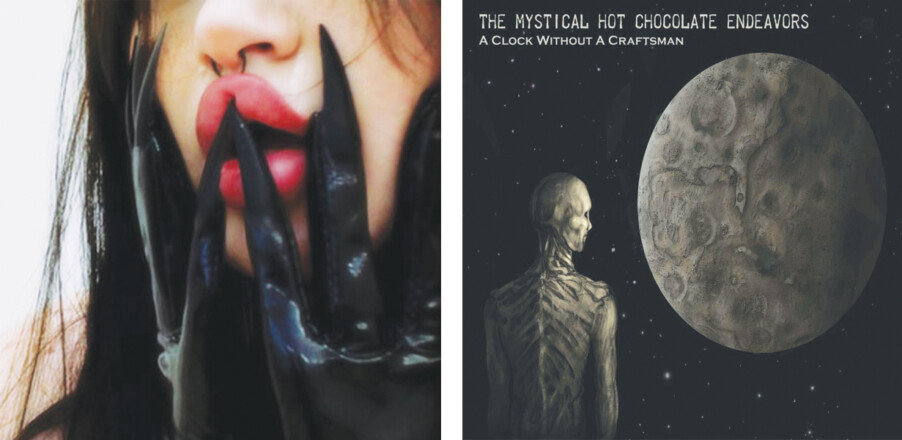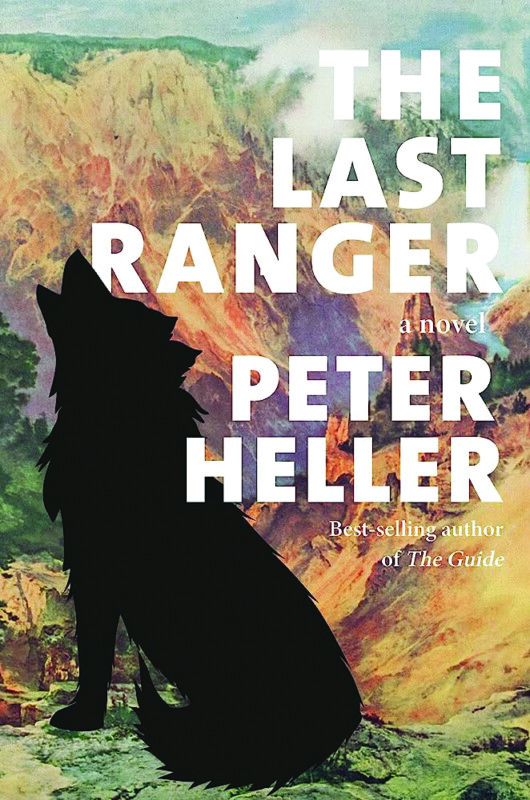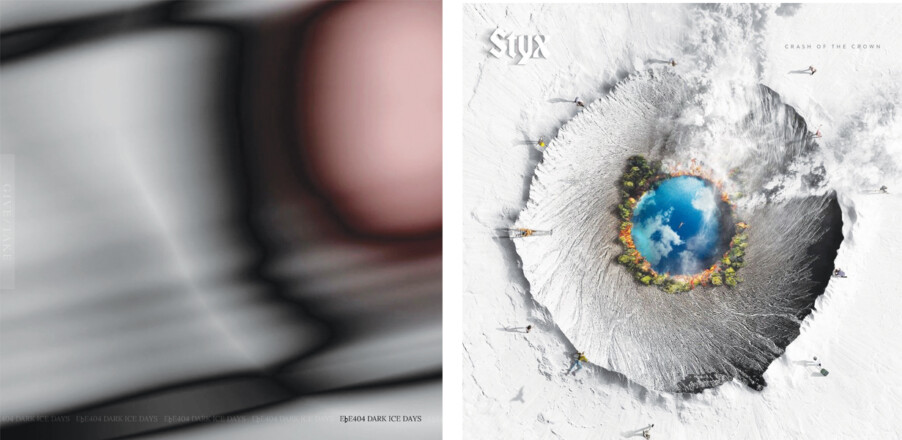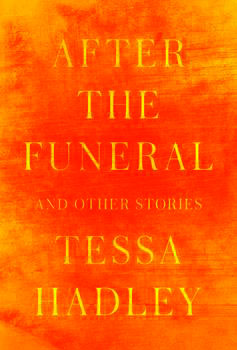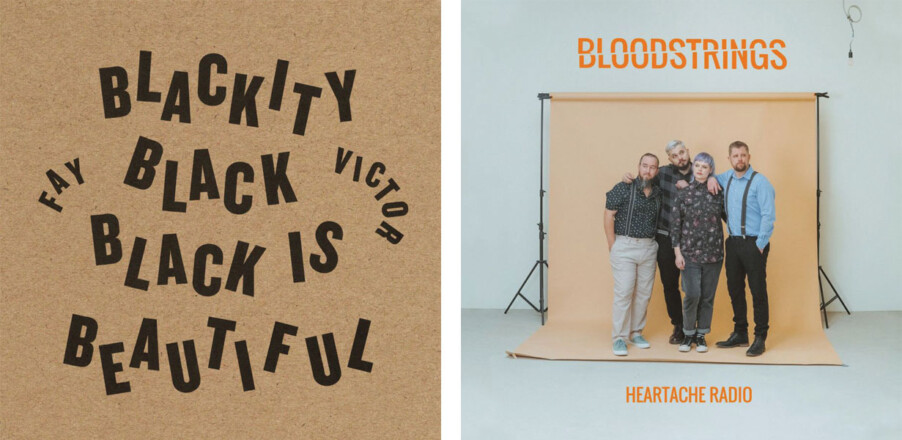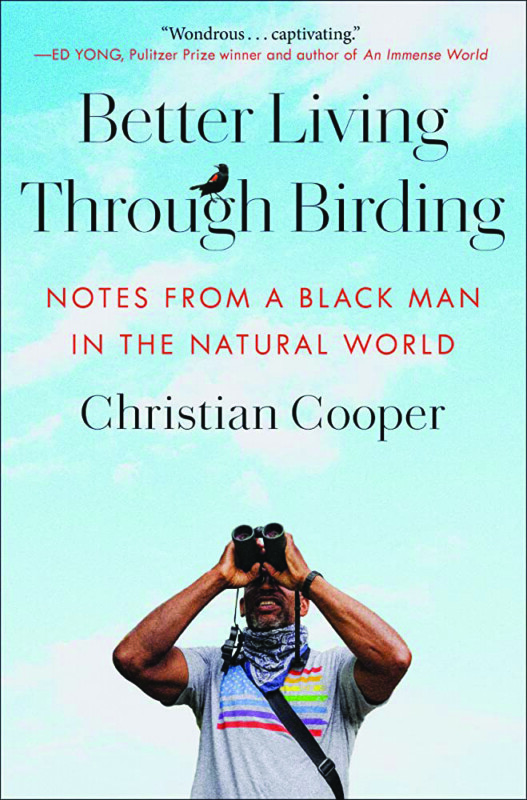Babychaos, “Guilty Hands (I Bleed)” (self-released)
Initial single heralding a fast-forthcoming EP from this eye-rollingly edgy goth chick, who, like Poppy (and you’ve already forgotten how awesome Poppy is, or at least was, I’ll bet), is Boston-based (this girl won the Metal Artist of the Year award at the 2022 Boston Music Awards), has a lot of gross slasher-movie stuff in her videos (Poppy wanted to be a one-woman Meshuggah before she foolishly abandoned that ship in a rush), has a lot of tattoos (I think Poppy’s are fake) and is a big social media influencer. Does that automatically make her interesting or important? No, it does not, but it might inspire some to become entranced by her siren song (she’s from Salem, Mass., by the way!), because — at least going by this single — her trip is part Marilyn Manson and part Evanescence — my stars, look at how edgy she is on this video! OK, may I go now? B
The Mystical Hot Chocolate Endeavors, A Clock Without A Craftsman (Massacre Records)
So I’d just finished up the Babychaos review (somewhere else on this page), and funnily enough Poppy has an album coming out as well, but the only advance I had in hand was a single, but even funnier-ly enough, this prog-rock band is from Boston as well, so let’s give this a whirl. This count-’em 98-minute double album from the four-piece group professed to enjoy dabbling in “everything from ’70s progressive rock, ’90s alternative rock/shoegaze, ’80s New Wave” to blah blah blah, this was a pleasant surprise. It’s tough to nail them down, not because they’re unfocused but because they really are good. A lot of this stuff really soars, toward a middle-of-the-road, aughts-indie-radio fashion: try to picture Nile with a Minus The Bear fetish, or just Minus The Bear, period, but 10 times more technically busy, and that’d be this. Seriously, if you’d be down with a more tech-metal Foo Fighters, this’d fit the bill for you. It’s already on my short list for Underrated Record Of The Year. A+
Playlist
• Oh, no, it’s August already, I am not ready for the summer to end, are you? Of course not, especially because you can be sure that Mother Nature will make up for the limp winter she sent us last year, remember? Yup, I only used the snowblower once, and since all the “snow” was actually just lemon slushie goop that was already half-melted, my indestructible 30-year-old snowblower was all like, “right, you know all I’m going to do is clog and stall, let’s just bag it and take a nap, there, buckaroo, it’ll be melted by morning, relax.” And it was, and what that means is that this winter will be a vengeance-wreaking hellscape of horizontally blowing ice-doom and Abominable Bumble monsters chasing Yukon Cornelius around and eating cars — oh, just tell me when it’s over and I can go have fish on the beach again, won’t you? Where was I, oh, yes, the new albums that are hitting the streets on Aug. 4, that was it. Art School Girlfriend is the pseudonym of Polly Mackey, a producer, multi-instrumentalist and vocalist from Wrexham, North Wales, and her new LP, Soft Landing, is headed this way right now. I just checked out the latest single, “Real Life,” from this music album, and it’s pretty cool if you like a little Portishead vibe with your Goldfrapp-style bedroom techno. It’s pretty somber and depressing overall, but her samples and grooves are quite nice indeed.
• Girl Ray is an all-female indie-rock trio from London, U.K., and look over there, their new album, Prestige, is on the way for delivery to stores this Friday, if there are indeed any record stores still in existence other than the Newbury Comics in Manchvegas, unless even that place stopped selling records and got into the vitamin supplements market. Anyway, this album is quite fascinating, or at least the tire-kicker single “Love Is Enough” certainly is; it leans heavily to a funky, almost progressive vibe a la Red Hot Chili Peppers, but with Lana Del Ray-ish vocals. Hard to picture, I know, right, but trust me on this, it’s impressive.
• Hey, Zoomers, did you know that once upon a time there was a TV show called General Hospital, and it starred this guy Rick Springfield as one of the doctor/model dudes or whatever they are? No, I can see you don’t, and I don’t blame you at all, just suffice to say he was basically the prototype for the Kardashians, except he didn’t know how to apply press-on fingernails, which is, admittedly, an essential survival skill. But whatnot, anyway, Springfield’s new “platter” is Automatic, I’ll bet it sucks beyond belief, let’s go listen to the title track, shaaaall we? Ack, it has a sample composed of unplugged guitar, and it moves really fast; the song sort of rips off Robert Palmer’s “Simply Irresistible.” You’d have to hear it for yourself, let’s move on.
• And finally we have Mammoth WVH, with their new album, Mammoth II. Guess what “WVH” stands for, I’ll bet you’ll never get it, it’s Wolfgang Van Halen, gawd, I miss his dad Eddie so bad, don’t you? Wolfgang plays almost all the instruments on this album, and the first single, “Take A Bow,” sounds like Creed trying to be the Foo Fighters, but take heart, maybe there are other songs on this album that will save the day and preserve Eddie’s legacy, I am not sure at this writing.
If you’re in a local band, now’s a great time to let me know about your EP, your single, whatever’s on your mind. Let me know how you’re holding yourself together without being able to play shows or jam with your homies. Send a recipe for keema matar. Message me on Twitter (@esaeger) or Facebook (eric.saeger.9).

